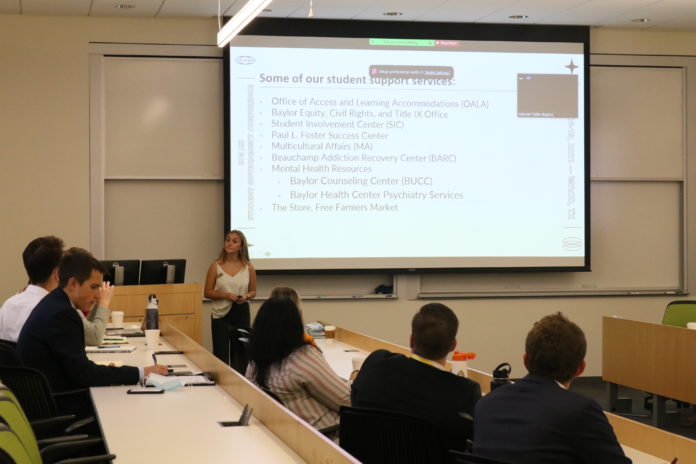
By Camille Cox | Staff Writer
Baylor Student Government hosted the Big XII Student Government Conference from Sept. 16 to Sept. 18, with representatives from the student governments of each of the Big XII schools traveling to Waco to collaborate and discuss ongoing campus procedures and problems.
With eight of the 10 Big XII schools attending, Baylor Student Government worked diligently in the past weeks to design, schedule and plan the weekend. The conference, which is hosted by a different Big XII school each semester, followed a schedule complete with hot-topic breakout discussions, a tour of McLane Stadium, branch and political sessions and a trip to the Howdy event that was held on campus on Sept. 17.
Baylor Student Government began planning in June, spending months to work out the logistics of hosting the representatives.
Student Body President Gracie Kelliher said that while designing the itinerary for the weekend, lots of planning went into finding a balance between content and fun activities.
“We had dinner downtown twice to highlight Waco, and we allowed for some breaks because everyone has their own transportation,” Kelliher said. “A couple schools went to Magnolia, and we put together postcards of our favorite spots in Waco.”
External Vice President Zach Tufenkjian served as the primary conference contact for the Big XII Student Government Conference. Tufenkjian said Baylor hosted the conference last year as well, although it was in a virtual capacity.
“The Big XII Student Government Conference is designed to collaborate with other Big XII schools and their respective student governments and student leaders to address issues in higher education and different issues that may be affecting our student bodies,” Tufenkjian said.
At the conference, each student government body spoke on what it has been focusing on at its institution, furthering the conversation between the schools over what issues are important to student bodies.
“On Friday, we had presentations from each institution about the structures of their student governments and also what issues and projects they’ve been working on,” Tufenkjian said. “For example, some institutions have been working on sexual violence prevention and others on food insecurity.”
Kelliher and Tufenkjian noticed the differences in COVID-19 procedures between Baylor — the only private school in attendance after TCU had to leave — and the other public schools.
“It became very clear that the way Baylor can handle COVID-19 protocol is much different than every other school can,” Kelliher said. “We can require testing every week, or we have access to people’s vaccine information to mitigate our spread with that extra set of data, whereas state schools are completely reliant on the guidelines their states set.”
Tufenkjian said student governments at public universities appear to have far less influence on COVID-19 procedures and policies than it does at Baylor.
The Big XII Student Government Conference allowed the student representatives to collaborate and make useful connections with one another, which can be beneficial in the future as they work to address problems within their institutions.
“Going forward, the most important thing on my end is those relationships and now being able to reach out to seven other student body presidents that I know in person,” Kelliher said. “One of the biggest benefits was realizing that most of the issues we are facing are not unique to Baylor, but every institution is also dealing with similar situations and combating them in very different or similar ways.”
The next Big XII Student Government Conference will be in the spring of 2022 and will be called Big XII on the Hill — held in Washington D.C., and coordinated by Oklahoma State University. Student governments that participate will be able to lobby and speak to federal officials to advocate for higher institutions.
“The fourth breakout session on Saturday was used to discuss which issues we wanted to advocate for when we went to D.C. in the spring — what kind of approach and just general information,” Tufenkjian said.
“There are two conferences a year: one in the fall and one in the spring,” Kelliher said. “The spring semester is held in D.C., and it is where we lobby for pieces of legislation that affect higher education, so the fall is kind of to nail down which topics will be most relevant for the host school going into the spring conference.”





